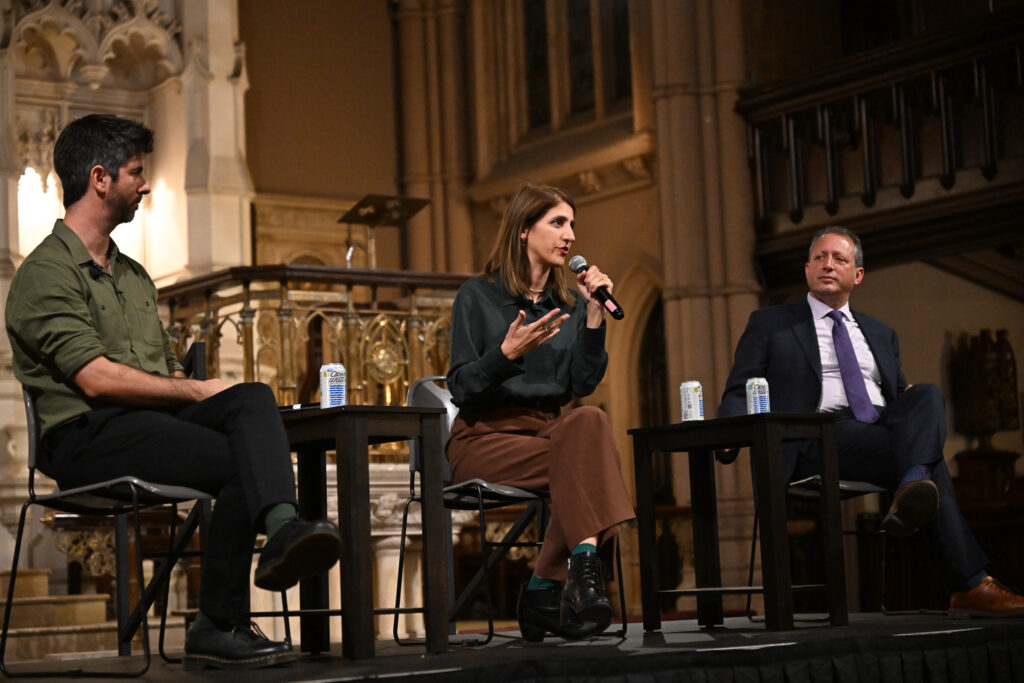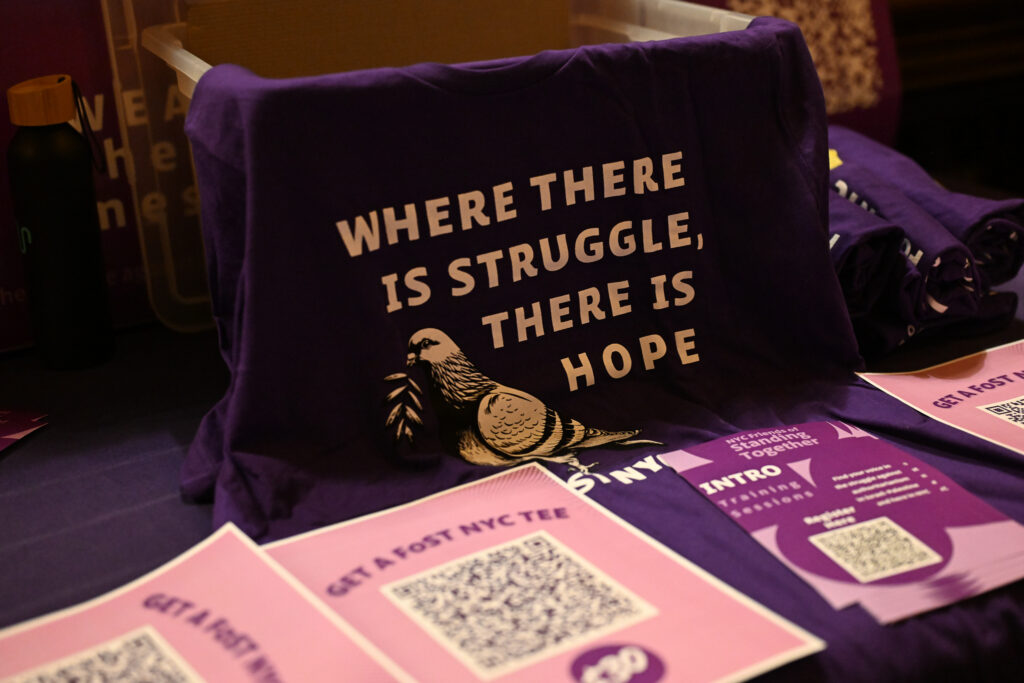Standing Together Solidarity Activists Come to Brooklyn
On November 12, in the cool Brooklyn evening air, a line several people abreast snaked around the block that houses St. Ann and the Holy Trinity Episcopal Church. They were waiting patiently to enter the impressive sanctuary that seats over 600 people.
“What’s going on?” one passerby asked me. I told her that Sally Abed and Alon-Lee Green, the co-directors of Standing Together, were on a panel. “Do you know who they are?” I followed up. “Yeah, I’ve heard of them,’ she replied before walking away.
A young guy was handing out leaflets about the need to primary Rep. Dan Goldman. (He had the right crowd.) Ironically, the evening’s moderator, City Controller Brad Lander, has been dropping hints that he is interested in Goldman’s seat.
I was standing next to Rabbi Abby Stein (A tenth-generation descendant of the Baal Shem Tov, founder of the Hasidic movement), who gave my friend an impromptu primer about the views of various Hasidic sects on the state of Israel and the role of the Crusaders in the history of Jerusalem.
Inside, New York City Friends of Standing Together had their volunteers checking people in, handing out literature for an upcoming training session, and announcing their presence by wearing deep purple T-shirts that read, “Where there is struggle, there is hope.” A one-pager announced its mission with the sentence, “Find your voice in the struggle against authoritarianism in Israel-Palestine and here in NYC.”
When everyone was finally seated, the three speakers came to the podium. The audience greeted them with a big round of applause. Lander began the conversation, announcing that they had both given him the courage to address the Occupation publicly.
Abed, who went first, said, “We come here holding so much grief and pain. We are in this together. We are one movement fighting authoritarians here in the United States and Israel-Palestine. It is a war against all our humanity.” Pointing out that the Israeli army now holds 50 percent of the Gaza Strip and that the bombing and starvation continue, Abed emphasized, “This is by no means a ceasefire. The West Bank is on fire. The West Bank is screaming.”
A new mother, Abed, 34, was the first member of the Joint List to serve in the Haifa City Council. She discussed building “a new alternative to the politics oppressing us,” creating a society where “justice, peace, and liberation” were linked to advancing better housing, transportation, education, and other municipal concerns. She noted that “a decade ago, there was no space to be a Palestinian citizen of Israel” while being herself. “Our political project is the most revolutionary thing I can do.”
Green thanked the crowd for its warmth and enthusiasm and shared his backstory. Born in Tel Aviv and raised by a single mother, he became aware of economic injustice early on. While working at a coffee shop chain, he challenged his boss, who was skirting fair-wage regulations, by organizing a strike that led to the formation of the first National Waiters’ Union in Israel. This experience helped him feel a sense of personal agency. There was a Palestinian-Israeli who was in leadership during the eighteen-month struggle, which sparked an “aha” moment for him – that a shared collective interest could advance an agenda.
Lander reflected on how the “model of solidarity” he and Mamdani espoused during the Mayoral campaign seemed to enrage many. He posed the question, “How do you think about the ongoing work when so many are threatened?”
For Abed, who has been with the movement for eight years, it’s a dual path that embraces her desire to reach Jewish Israelis while being insistent on speaking out about her identity as a Palestinian. She questioned, “What does it mean to be part of Israeli society, especially with the current high levels of hate? When the government called for genocide, citizens normalized it.”
Continuing, Abed stressed, “When you are serious about trying to change a society you are part of, you have to understand that society.” Abed qualified the political spectrum as ranging from the “fascist extreme right to the mild center.” This thinking yields a toolbox comprised of “military control, incarceration, and taking over Gaza.” With Israelis feeling very isolated, Abed probed, “How do we present to the Israeli population the radical idea of peace?”
On the possibility of a new political party in Israel to advance a fresh vision, Green responded that joint slates are an aspiration, but that Standing Together will not launch its own party. “We are resisting occupation, building communities, and mobilizing the public. We have 7,000 registered members, some of whom are in political parties.” Green underscored, “Peace is not on the menu.” Challenging the current system and making that an option is. Green envisions a “peace and equality party composed of Israeli Jews and Palestinians.” He remarked on the mindset as it stands. “It’s an us or them mentality. If you want to be safe, you have to control them [Palestinians].”
Standing Together has been working with Palestinian Israelis to promote activism, including helping to get relief into Gaza. Together, they gathered 400 aid trucks, although only 250 were allowed in. They formed a “Humanitarian Guard” to protect convoys under attack by right-wing Israelis. Their members also regularly participate in “protective presence” activities to defend Palestinian farmers from settler violence during their olive harvest.
Shifting focus to the United States, the topic of “gatekeeping” at American college campuses came up. Green stated his unequivocal belief: “We are not part of a football match [where you] dehumanize the other. If your politics is canceling the other, you’re part of the problem.” There was an acknowledgment of the disagreements among various groups on “tactics and language.”
During the Q&A period, the issue of BDS arose, including the fact that Standing Together has been called out by The Palestinian Campaign for the Academic and Cultural Boycott of Israel (a founding member of the BDS movement). Like Jews, Palestinians are not a monolithic movement in their views or approaches. (See Peter Beinart on this BDS claim.)
With a call to recognize a “shared humanity” as a basis for moving forward, Green repeated the oft-stated phrase: “No one is going anywhere.” Which led back to Lander’s question, “What kind of relationship do we want to be in with each other?”
Lander called on the audience to contact their elected officials about blocking the sale of bombs to Israel. As Abed pointed out, “What is happening in Israel-Palestine is being subsidized by the United States government and your tax dollars.” Her analogy was, “Israel right now is a drunk lunatic, with the USA giving them shots.”
The evening closed with Lander prompting Green and Abed to share, “What gives you hope?”
Green said, “After these two years of seeing videos of Gaza, being with hostages, being in jail, and getting death threats, the movement is still together. I don’t have certainty of a timeline.” His belief is that fighting for a difference in an on-the-ground reality is a form of hope.
“What is hope?” asked Abed. “Belief in our collective ability to make change. I want to live in my homeland. I want a safe life. I want the Jewish people to be part of this beautiful homeland. The idea is so simple.”
Photo credits: Gili Getz
* * * * * * * * * * * * * * * * * * * * * * * * * * * * * * * * * * * * * * * * * * * * * * * * * * * * * *
There are currently numerous organizations mobilized to contact elected representatives on the “Block the Bombs Act” (H.R. 3565). You can do so as an individual constituent by calling both the district and the Washington office number. This link will direct you to your representative.






